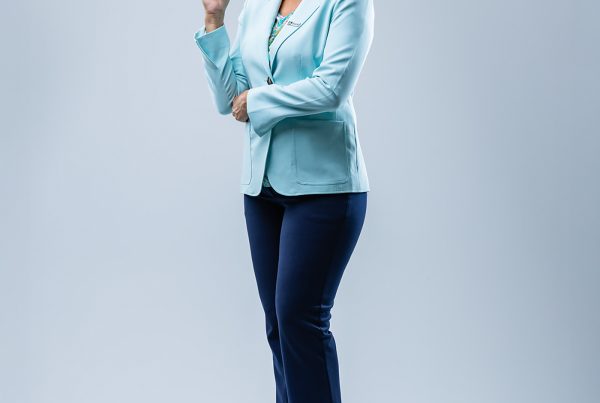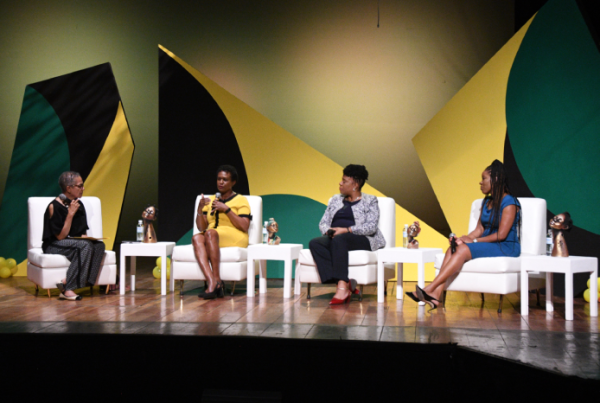Dr Andre Williams (right), integrative oncologist, converses with Senator Dr Saphire Longmore (centre), consultant psychiatrist and breast cancer survivor and Executive Director of the Jamaica Cancer Society, Yulit Gordon, following a recent Think Tank session, organised by The Jamaica National Group, as part of its “Power of Pink” campaign, in observance of Breast Cancer Awareness Month. The Jamaica Cancer Society and Jamaica Reach to Recovery will be beneficiaries of this year’s JN Power of Pink campaign, which is geared towards raising well-needed funds to assist in the fight against breast cancer.
Just like their female counterparts, men with close relatives who have been diagnosed with breast cancer have a higher risk of developing the disease.
This was disclosed by Dr Andre Williams, Integrative Oncologist, Teshuva Wellness, who noted that while male breast cancer is very rare, men are not exempt from getting the disease.
Dr Williams was speaking during a recent interview at the third and final staging of The Jamaica National Group’s Think Tank session entitled: “Beyond Breast Cancer.”
Less than one percent of all breast cancer cases develop in men and only one in a thousand men, will ever be diagnosed with the dreaded disease.
Tips for breast cancer self-examination in men are similar to those for women. They include checking for lumps around the nipple and armpit; looking for changes in peck size; any changes in nipple colour; and discharge from the nipples.
“There isn’t current recommendation for men to do screening for breast cancer. Generally, what happens in a man is that, he finds a lump in his chest region, or in what is really his breast or behind his nipples; and that’s usually the first time that men will realise that there’s a problem. Therefore, we use that as a kind of screening method,” Dr Williams explained.
“Therefore, if you’re a man and you find a lump in your breast or your chest, then that’s the first sign that you need to get yourself checked out,” he advised.
Dr Williams noted that male breast cancer is most common in older men, about 65-years-old, although it can occur at any age.
He said men diagnosed with the disease at an early stage have a good chance of survival.
Roland Thwaites, Member of Parliament and breast cancer survivor, who was diagnosed with the disease 30-years ago, after his wife found a lump in his right breast, is encouraging men to be conscious of their risk.
Mr Thwaites, who underwent surgery to remove the mass, said he never thought that men were vulnerable to breast cancer prior to his ordeal.
“I am deeply grateful that it was dealt with promptly. I really want to encourage people not to be afraid of dealing with their health problems,” he advised. “What the incident did for me was to confirm the need for general health care; and particularly, to submit myself to; and encourage others, to do a yearly examination.”
Mr Thwaites pointed out that surviving breast cancer has caused him to be extra vigilant about his health and the health of his loved ones. “This experience simply confirmed to me that, you need to be extremely careful; and it’s quite silly to allow fear to get in the way of a healthy lifestyle,” he said.
The Member of Parliament said he would be using his time left in representational politics to lobby for universal coverage for mammograms for all Jamaican women.
“We need to ensure that we spend the money, so that every woman in Jamaica can have a mammogram on a regular basis, without reference to the amount of money she has in her pocket,” he remarked. “It would cost less than $1 billion a year to provide mammograms, universally.”
Mr Thwaites pointed out that the economic burden on both the state and citizens to treat breast cancer, after it is at an advanced stage, far outweighs the cost to provide affordable screening for the female population. “It is a bargain to spend the money to do it that way, because when breast cancer does take place undetected, it is far more expensive to treat,” he affirmed.
The JN Group’s Beyond Breast Cancer Think Tank session was held as part of its Power of Pink activities for Breast Cancer Awareness Month, which was observed in October.





